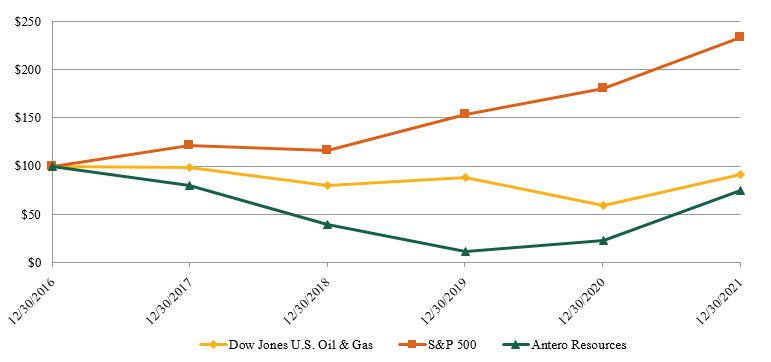future in acquiring prospective reserves, developing reserves, marketing hydrocarbons, attracting and retaining quality personnel and raising additional capital, which could have a material adverse effect on our business.
Strategic determinations, including the allocation of capital and other resources to strategic opportunities and repayment of indebtedness, are challenging, and our failure to appropriately allocate capital and resources among our various initiatives may adversely affect our financial condition.
Our future success depends on whether we can identify optimal strategies for our business. In developing our 2022 business plan, we considered allocating capital and other resources to various aspects of our businesses, including well development, exploratory activities, corporate items, repayment of indebtedness and other alternatives. Notwithstanding the determinations made in the development of our 2022 plan, business opportunities not previously identified periodically come to our attention, including possible acquisitions and dispositions. If we fail to identify optimal business strategies, including the appropriate corporate structure or the appropriate rate of reserve development, or fail to optimize our capital investment and capital raising opportunities and to use our other resources to further our business strategies, our financial condition may be adversely affected. Moreover, economic or other circumstances may change from those contemplated by our 2022 plan, and our failure to recognize or respond to those changes may limit our ability to achieve our objectives.
We periodically engage in acquisitions, dispositions and other strategic transactions, including joint ventures. These transactions involve various inherent risks, such as our ability to obtain the necessary regulatory approvals; the timing of and conditions imposed upon us by regulators in connection with such approvals; the assumption of potential environmental or other liabilities; and our ability to realize the benefits expected from the transactions. In addition, prevailing market conditions and other factors could negatively impact the benefits we receive from transactions. Competition for acquisition opportunities in our industry is intense and may increase the cost of, or cause us to refrain from, completing acquisitions. Our inability to complete a transaction or to achieve our strategic or financial goals in any transaction could have significant adverse effects on our financial position, results of operations and cash flows.
A pandemic, epidemic or outbreak of an infectious disease, such as COVID-19, may materially adversely affect our business.
The global or national outbreak of an infectious disease, such as COVID-19, may cause disruptions to our business and operational plans, which may include (i) shortages of employees, (ii) unavailability of contractors and subcontractors, (iii) interruption of supplies from third parties upon which we rely, (iv) recommendations of, or restrictions imposed by, government and health authorities, including quarantines, to address the COVID-19 pandemic and (v) restrictions that we and our contractors and subcontractors impose, including facility shutdowns, to ensure the safety of employees and others. While it is not possible to predict their extent or duration, these disruptions may have a material adverse effect on our business, financial condition and results of operations.
Further, the effects of COVID-19 and concerns regarding its global spread have negatively impacted global demand for crude oil and natural gas, which has and could continue to contribute to price volatility, impact the price we receive for natural gas, NGLs and oil and materially and adversely affect the demand for and marketability of our production, as well as lead to temporary curtailment or shut-ins of production due to lack of downstream demand or storage capacity. Additionally, to the extent the COVID-19 pandemic adversely affects our business and financial results, it may also have the effect of heightening many of the other risks set forth in this “Item 1A. Risk Factors.”
Terrorist attacks, cyberattacks and threats could have a material adverse effect on our business, financial condition or results of operations.
Terrorist attacks or cyberattacks may significantly affect the energy industry, including our operations and those of our suppliers and customers, as well as general economic conditions, consumer confidence and spending, and market liquidity. Strategic targets, such as energy-related assets, may be at greater risk of future attacks than other targets in the United States. We depend on digital technology in many areas of our business and operations, including, but not limited to, estimating quantities of oil and gas reserves, processing and recording financial and operating data, oversight and analysis of drilling operations, and communications with our employees and third-party customers or service providers. We also collect and store sensitive data in the ordinary course of our business, including personally identifiable information of our employees as well as our proprietary business information and that of our customers, suppliers, investors and other stakeholders. The secure processing, maintenance and transmission of information is critical to our operations, and we monitor our key information technology systems in an effort to detect and prevent cyberattacks, security breaches or unauthorized access. Despite our security measures, our information technology systems may undergo cyberattacks or security breaches including as a result of employee error, malfeasance or other threat vectors, which could lead to the

